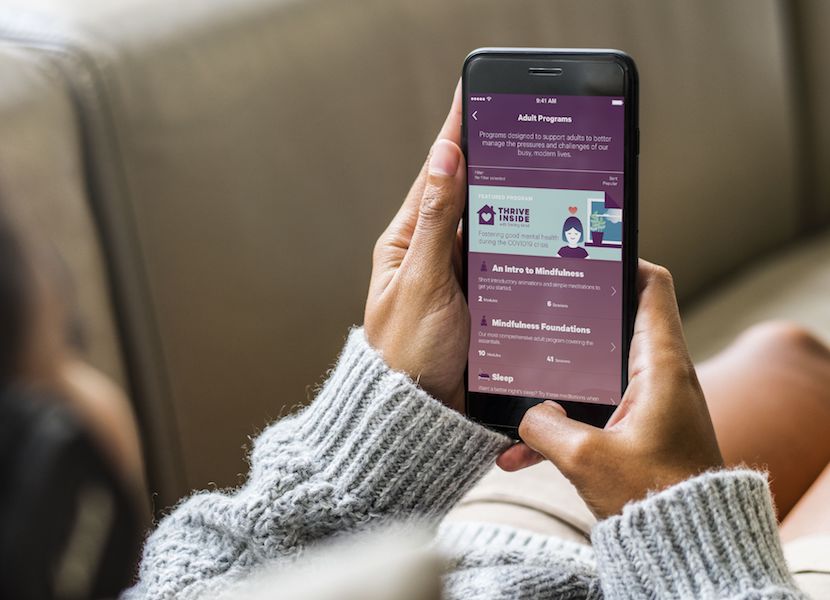Smiling Mind’s CEO on how to be positive and proactive about your mental health right now
WORDS BY ELLA BAZZANI-HOCKLEY
Now is the perfect time to work on being present.
COVID-19 has completely transformed the way we socialise, and the extent to which this is impacting our mental health is still unknown. But one thing is clear; people are, unsurprisingly, feeling much more distressed than usual. Dr Addie Wootten, the CEO of Smiling Mind, a non-for-profit web and app-based meditation program, told me that March was the company’s biggest month on record.
Since the March 14 lockdown announcement more than four weeks ago, the number of downloads of the Smiling Mind app has doubled, and traffic to the website is up more than 500 per cent.
We’re all mounting a steep self-isolation learning curve, and Smiling Mind has tailored meditation programs that can help us through these new challenges. There’s a real silver lining, Addie says, in that we all finally have the time to prioritise meditation. After all, we’re all looking for new ways to fill the long, cabin-feverish days of WFH.
“I think that the volume of people using the app is speaking to that, that people are actually thinking, maybe now I’m going to try that thing I’ve always wanted to try. And I think in the context of the uncertainty that we’re facing, I think using that time to build new practices and routines is really important for our mental health.”
Back in 2012, the app’s developers, Jane Martino and James Tutten saw a gap in the youth mental health space, and as serial entrepreneurs, jumped on the opportunity. The increasing imbalance between young people’s virtual connectedness and real-life emotional isolation offered space for a new venture combining technology and psychology, and Wootten is pleased with the results.
Wootten has a background in clinical psychology and believes that, despite the steady rise of youth anxiety and depression in recent years, the ease with which we can download an app and get focused on our mental health can provide us with new solutions.
She speaks to the advantage that an app can have over an appointment with a psych – reluctance to book an appointment with a doctor, get a referral, and take those difficult few steps to talk through a tough issue can often prevent people from being proactive. It’s a lot easier to download an app than it is to sit down with a doctor and the Smiling Mind team is motivated by this fact.
Wooten believes we’re seeing the advantages of our technological fluency right now. “I think we’re probably seeing the benefits right now in the context of social distancing – that people who are fluent in using technology will be connecting with their friends and family a lot, whereas older people who aren’t as digitally savvy will be feeling more isolated.”
She thinks social media, in particular, can get a bad rap due to it being linked to low self esteem, FOMO and loneliness, but apps can offer a uniquely situated solution. Keeping in mind the distressing nature of the current news cycle, learning how to manage reactiveness is key.
“Knowing when you’re reacting to something that someone’s posted in a bad way, or you’re using it as a tool to judge yourself, building that awareness and that ability to navigate those things, is really important. And so I think it’s not going away, and we have to learn how to make it work for us.”
Just 10 minutes a day every day can become a ‘regular’ practice. At least three to five practices a week, over a period of eight weeks, Wooten explains, can result in a massive change. From a physiological perspective, mindfulness can reduce the stress hormone cortisol, changing the way the body regulates stress, and making us less reactive. Watching the news, for example, will become less anxiety-inducing, and our physical reactions to housemates or family members will be be calmer.
In terms of general wellbeing, an ongoing meditative practice can reduce anxiety and symptoms of depression, as well as improve concentration, cognitive processing and our ability to focus. Your ability to regulate emotions can also improve; you might feel less reactive, more in tune with the people around you and able to connect more deeply.
The process works through building up an awareness of our thought process. “When we practice mindfulness, we’re strengthening our minds’ ability to focus on one thing at one time. So rather than being caught up in worries about the future, or rehashing the past, we’re actually training ourselves to stay in the present moment, and that means we’re more able to focus on the things that might give us a bit of joy, that we’re grateful for.”
Smiling Mind’s new program, Thrive Inside (developed in response to COVID-19), has a range of meditations, from “SOS” moments when you’re feeling especially stressed, self-compassion exercises, and short gratitude practices designed to promote positivity.
For those who might be new to the practice, the app’s Foundations program introduces new users to basic meditation techniques, building on body-scan exercises, how to tune in to the breath, and how to build an awareness of the senses. Wootten’s top tip for new users is to find somewhere quiet, calm and safe.
“Drop the expectation that the mind needs to be quiet, and that you need to not think about anything at all. That’s impossible for all of us, we all think… The practise of meditation is just noticing that you’re thinking, and trying to bring your mind back to what you were thinking. That’s meditation.”










